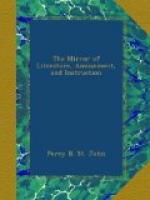and runaways from the army came rushing in at the
Porte de Namur, and these fugitives increased
the public panic to the utmost. Sauve qui peut!
now became the universal feeling; all ties of friendship
or kindred were forgotten, and an earnest desire to
quit Brussels seemed to absorb every faculty.
To effect this object, the greatest sacrifices were
made. Every beast of burthen, and every species
of vehicle were put into requisition to convey persons
and property to Antwerp. Even the dogs and fish-carts
did not escape—enormous sums were given
for the humblest modes of conveyance, and when all
failed, numbers set off on foot. The road soon
became choked up—cars, wagons, and carriages
of every description were joined together in an immovable
mass and property to an immense amount was abandoned
by its owners, who were too much terrified even to
think of the loss they were sustaining. A scene
of frightful riot and devastation ensued. Trunks,
boxes, and portmanteaus were broken open and pillaged
without mercy; and every one who pleased, helped himself
to what he liked with impunity. The disorder
was increased by a rumour, that the Duke of Wellington
was retreating towards Brussels, in a sort of running
fight, closely pursued by the enemy; the terror of
the fugitives now almost amounted to frenzy, and they
flew like maniacs escaping from a madhouse. It
is scarcely possible to imagine a more distressing
scene. A great deal of rain had fallen during
the night, and the unhappy fugitives were obliged
literally to wade through mud. I had, from the
first, determined to await my fate in Brussels; but
on this eventful morning, I walked a few miles on
the road to Antwerp, to endeavour to assist my flying
countrymen. I was soon disgusted with the scene,
and finding all my efforts to be useful, unavailing,
I returned to the town, which now seemed like a city
of the dead; for a gloomy silence reigned through
the streets, like that fearful calm which precedes
a storm; the shops were all closed, and all business
was suspended. During the panic of Friday and
Saturday, the sacrifice of property made by the British
residents was enormous. A chest of drawers sold
for five francs, a bed for ten, and a horse for fifty.
In one instance, which fell immediately under my own
observation, some household furniture was sold for
one thousand francs, (about 40 l.) for which the owner
had given seven thousand francs, (280 l.) only three
weeks before. This was by no means a solitary
instance; indeed in most cases, the loss was much
greater, and in many, houses full of furniture were
entirely deserted, and abandoned to pillage.




